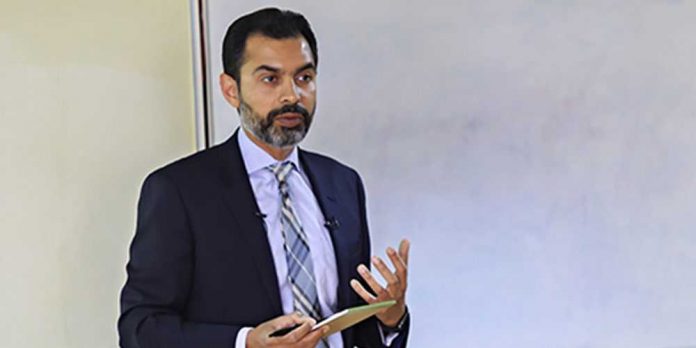- Dr Reza Baqir says exchange rate regime part of economic reforms
- Says SBP keeping close eye on forex market, will intervene in case of excess volatility
ISLAMABAD: State Bank of Pakistan (SBP) Governor Dr Reza Baqir on Monday said that the central bank has completed all the tasks of the International Monetary Fund (IMF) without disclosing any details of what those tasks were.
He said this while giving a briefing on the economic outlook of the country and the role of the central bank. He said that the details would be made public following a board meeting which has been scheduled for July 3.
Reza Baqir also said that the government’s economic team is currently working on stabilising the economy and the steps taken in this regard have started yielding results. He said that the fiscal deficit increased because of added debt but the government is countering it through austerity measures. The government has also worked a lot to overcome the external deficit by getting aid from friendly countries, he added.
“It is of utmost importance to overcome the twin deficits which have led to economic instability in the country,” he added.
He said that exchange rate regime should be seen as a part of a broader package of economic reforms in the country, adding that keeping a fixed rate for a long time had led to the situation the country was currently facing.
“Our exchange rate regime should be seen as a part of a broader package of economic reforms. There are a lot of influences on our country’s exchange rate policy,” Baqir said while addressing a press conference here.
“In the past, one of the challenges faced by the SBP has been interference by the government. Specifically, when the government wants to borrow money but is unable to secure a loan from a commercial bank, it turns to the central bank. When the SBP finances the government, it has an inflationary effect and puts pressure on the exchange rate,” he explained.
“Under this budget, the government will not borrow from the SBP,” he said, adding that the decision would make an improvement in the exchange rate.
The central bank governor showed off a chart mapping the average quarterly historical exchange rate against the external deficit. “While the (exchange rate) remained fixed for a long time, the (external deficit) began increasing and kept increasing. The development alongside this was that our reserves were depleting,” he said.
“It was not an appropriate policy to keep a fixed exchange rate for long, due to which our situation today has been created.”
The SBP governor said neither a fixed exchange rate ─ as had been in the past ─ nor a free float was appropriate for the economy.
“If the fixed rates are not right, we sustain damage. On the other hand, the free float is not appropriate for us either. In the free float regime, the basic concept is that it is solely determined by market forces and the State Bank has no role in it. This policy is not at all okay for us because when the exchange rate is determined, there are some factors which are fundamental, and some which are based on market sentiment. The market sentiment sometimes overtakes the fundamentals, that’s why a free float is not appropriate.”
He went on to say that in light of these realities, the government had adopted a market-based exchange rate system which “we are running on now”.
“In the market-based system, you consider supply and demand factors, what side they are pulling the exchange rate, and you don’t suppress them. And this is fundamental ─ we keep a close eye on the market, and if there is excessive volatility […] or special pressures, the SBP intervenes. And we will continue to do so to make sure that there isn’t excessive volatility or ‘disorderly market conditions’, as economists say,” Baqir clarified.
He explained that the government favoured this regime because “if you take demand and supply factors into account, and the exchange rate takes on market value, that will be best for our exports.”
“Since the exchange rate began moving towards its market value, the imports have decreased and export volumes have recently started increasing,” he said.
He explained that as the exchange rate depreciates, causing imports to fall, it will have an import substitution effect on the local industries which compete with imported goods. “They have more space to compete, and they will be benefited, as will the country.”
Currently, he said, a seasonal pattern of outflows being observed due to yearly closing of accounts by companies has been putting pressure on the exchange rate. “We used to suppress it, but after imposition of the market-based rate, the impact is noticeable,” he said.
“The main point is that…there will be two-way movement (in the exchange rate).”




